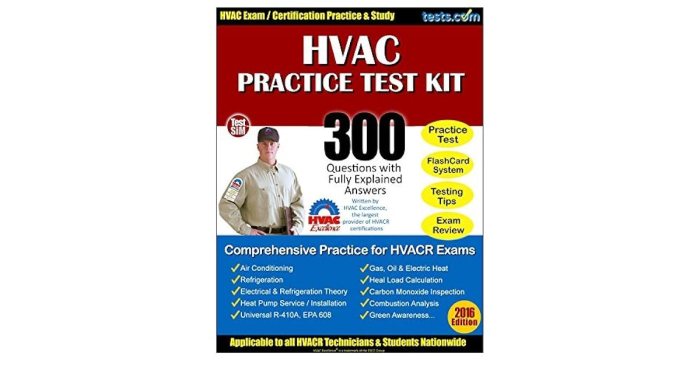Hvac journeyman practice test free – Ace your HVAC journeyman certification with our comprehensive practice test, available free online. This invaluable resource provides a realistic simulation of the actual exam, helping you identify strengths, weaknesses, and areas for improvement.
Delve into the intricacies of HVAC systems, troubleshoot common problems, and reinforce your knowledge with our expertly crafted practice questions. Enhance your confidence and elevate your HVAC career with our free practice test today.
HVAC Journeyman Certification Overview: Hvac Journeyman Practice Test Free

HVAC journeyman certification is a credential that demonstrates a technician’s knowledge and skills in the heating, ventilation, air conditioning, and refrigeration (HVAC) industry. It is a valuable asset for individuals seeking employment or advancement in the field.
Benefits of obtaining certification include:
- Increased job opportunities
- Higher earning potential
- Enhanced credibility and reputation
- Improved safety and efficiency on the job
The certification process typically involves completing an apprenticeship program, passing an exam, and meeting certain experience requirements.
HVAC Journeyman Practice Test Structure
The HVAC journeyman practice test is designed to assess a technician’s knowledge and skills in various areas of HVAC.
The test is typically divided into the following sections:
- Safety
- Tools and materials
- Heating systems
- Cooling systems
- Ventilation systems
- Refrigeration systems
- Electrical systems
- Troubleshooting
To prepare for the test, it is recommended to study the HVAC journeyman certification exam blueprint, which Artikels the specific topics covered on the exam.
HVAC Journeyman Practice Test Questions

The following table provides sample practice test questions for the HVAC journeyman certification exam:
| Topic | Question | Answer Choices | Correct Answer |
|---|---|---|---|
| Safety | What is the most common cause of electrical accidents in the HVAC industry? |
|
a |
| Tools and materials | Which type of wrench is best suited for tightening flare fittings? |
|
d |
| Heating systems | What is the purpose of a flue damper in a gas furnace? |
|
a |
HVAC Journeyman Practice Test Analysis
Analyzing the results of a practice test can help identify areas where additional study is needed.
To analyze the results, follow these steps:
- Review the questions you answered incorrectly.
- Identify the topics that you need to study further.
- Create a study plan to address the areas where you need improvement.
By following these steps, you can improve your chances of passing the HVAC journeyman certification exam.
Additional Resources for HVAC Journeyman Certification
In addition to studying the HVAC journeyman certification exam blueprint, there are a number of resources available to help you prepare for the exam, including:
- Online study materials
- Certification preparation courses
- Hands-on training opportunities
By taking advantage of these resources, you can increase your knowledge and skills and improve your chances of passing the exam.
Quick FAQs
How many questions are on the HVAC journeyman practice test?
The number of questions may vary depending on the specific practice test you choose. However, most practice tests typically include around 100-150 questions.
Is the HVAC journeyman practice test timed?
Some practice tests may be timed to simulate the actual exam conditions. However, many practice tests allow you to take them at your own pace.
What topics are covered on the HVAC journeyman practice test?
Practice tests typically cover a wide range of HVAC topics, including refrigeration, heating, ventilation, air conditioning, and electrical systems.